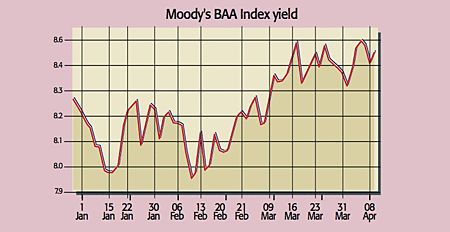
Investors in corporate bonds tend to be more rational than equity investors, says Tim Price of PFP Wealth Management. They have “comparatively modest upside” from coupon payments or capital gains, but risk losing everything if their assessment of the firm is wrong and it goes bust. The fact that they tend to analyse corporate fundamentals more carefully means that corporate bonds have “an uncanny history of marking turning points” in stockmarkets. As CLSA’s Russell Napier points out, the Lehman Corporate Bond Index for BAA-rated (medium quality) bonds bottomed two months before equities in 1974 and ten months before in 1982. Corporate bonds also troughed two months before stocks in 1921 and 1932.
So history implies that if the current equity market upswing is to be sustainable, corporate bonds should be leading the way as they sniff out an economic recovery first. Yet there has been little evidence of a credit revival of late, even as stocks have charged ahead. The yield on Moody’s bond index covering US BAA-rated bonds has ticked up slightly since mid-March (reflecting falling prices), while its spread over Treasuries (the extra yield investors require over government debt) has widened by around 0.5% over the past month. The yield on the Moody’s A-bond index has moved sideways over the past few weeks, while the FTSE Sterling index of investment-grade corporate bonds is also pretty much where it was when the stockmarket rally began.
The situation in the junk (or sub-investment grade) bond market is hardly encouraging. March saw 35 global speculative-grade defaults, the most in any month since the Great Depression. In the first quarter there were 79, compared to 16 a year before. Jim Reid of Deutsche Bank thinks defaults on US junk bonds over the next five years could reach 53%, more than the 45% five-year rate in the Great Depression. If we’re in for defaults anywhere near that figure, US yields on junk bonds could go even higher, says Lex in the FT. All in all, “credit markets are in a profound slump, largely immune to rallies in other assets”.
In short, equity investors should beware. However, since yields remain historically high and government bonds look overpriced, investment-grade bonds still look a good bet for income seekers. We like the M&G Corporate Bond Fund.